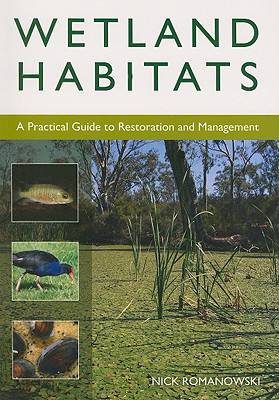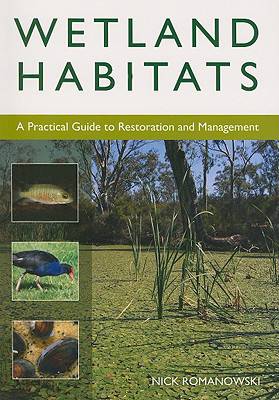
Door een staking bij bpost kan je online bestelling op dit moment iets langer onderweg zijn dan voorzien. Dringend iets nodig? Onze winkels ontvangen jou met open armen!
- Afhalen na 1 uur in een winkel met voorraad
- Gratis thuislevering in België vanaf € 30
- Ruim aanbod met 7 miljoen producten
Door een staking bij bpost kan je online bestelling op dit moment iets langer onderweg zijn dan voorzien. Dringend iets nodig? Onze winkels ontvangen jou met open armen!
- Afhalen na 1 uur in een winkel met voorraad
- Gratis thuislevering in België vanaf € 30
- Ruim aanbod met 7 miljoen producten
Zoeken
€ 53,95
+ 107 punten
Omschrijving
Wetland Habitats is a practical manual that puts developments in the field of wetland restoration and conservation of diverse animal species into plain English, placing much of the more recent work in this field into a single, coherent and user-friendly framework. As with Planting Wetlands and Dams, the text explains the various approaches to and aspects of each problem, so that readers will be able to make informed decisions about managing wetlands on their own properties.
Although the examples are drawn from a wide range of wetland animals, including some which aren't necessarily found in wetlands on private properties, the primary emphasis will be on species and aspects of management that are likely to be of most use to landholders with wetlands to be restored, or species in need of conservation.
The plants and planting aspects of created wetlands and dams are dealt with in detail in the second edition of Planting Wetlands and Dams.
Key features:
- Reversing the effects of drainage, grazing, weirs, deteriorating water quality and associated algal problems, and allowing for global warming and sea level rises
- Setting realistic targets for wetland restoration and longer-term goals for management
- Understanding natural change in wetlands - seasonal, ecological and chemical
Although the examples are drawn from a wide range of wetland animals, including some which aren't necessarily found in wetlands on private properties, the primary emphasis will be on species and aspects of management that are likely to be of most use to landholders with wetlands to be restored, or species in need of conservation.
The plants and planting aspects of created wetlands and dams are dealt with in detail in the second edition of Planting Wetlands and Dams.
Key features:
- Reversing the effects of drainage, grazing, weirs, deteriorating water quality and associated algal problems, and allowing for global warming and sea level rises
- Setting realistic targets for wetland restoration and longer-term goals for management
- Understanding natural change in wetlands - seasonal, ecological and chemical
Specificaties
Betrokkenen
- Auteur(s):
- Uitgeverij:
Inhoud
- Aantal bladzijden:
- 178
- Taal:
- Engels
- Reeks:
Eigenschappen
- Productcode (EAN):
- 9780643096462
- Verschijningsdatum:
- 1/10/2010
- Uitvoering:
- Paperback
- Formaat:
- Trade paperback (VS)
- Afmetingen:
- 168 mm x 241 mm
- Gewicht:
- 453 g

Alleen bij Standaard Boekhandel
+ 107 punten op je klantenkaart van Standaard Boekhandel
Beoordelingen
We publiceren alleen reviews die voldoen aan de voorwaarden voor reviews. Bekijk onze voorwaarden voor reviews.











